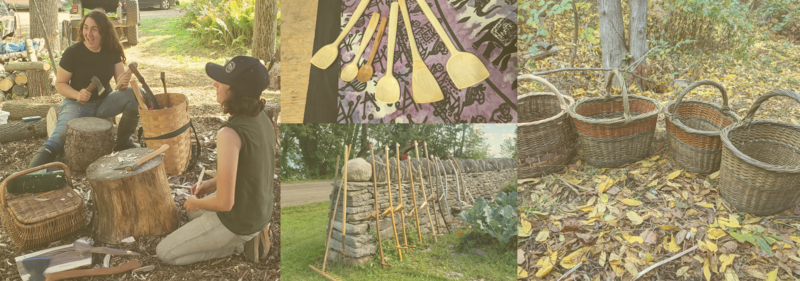Welcome to the UW Lands Skills for Wellness and Sustainability Project
Links to Contents
Introduction
Starting in the Spring Term 2023, we are hosting a series of workshops designed to connect students, faculty and staff to skills which will help build new relationships with the land, natural materials and community.
There is an urgent need for social transformations towards sustainability, and while we might address this through technical innovation, questions about sustainability as a crises of perception remain. The World Health Organisation reports that mental health disorders are the leading cause of years lived with disability, affecting 1 in 8 people world wide, and is particularly acute in Canada for young people and at Canadian Universities. The mental health crises is intimately linked to the sustainability and is recognised in at least 3 Sustainable Development Goals (#3 Healthy Lives and Wellbeing, #11 Poverty and #10 Inequality). There is a growing body of evidence linking craft and skills practice, connection to nature and to communities of care to personal wellness and sustainability outcomes (link coming soon).
Goals of the LSWS
This project builds on the evidence that both mental health and attitudes to sustainability can be improved by connection to nature and nature-based activities, particularly making from natural materials; building connections to land, place and community; and engagement in “flow” activities where opportunities for material consumption are replaced by mindful experiences.
Disconnection to Nature is increasingly recognized as contributing to the mental health crisis. In “Last Child in the Woods” Richard Louv identifies Nature Deficit Disorder and recounts how direct exposure to nature is key for the physical and emotional health. Additionally, working in and with nature and natural materials promotes wellness. In an article summarizing research on crafts and skills, the UK Crafts Council presented evidence that these somatic experiences can alleviate the symptoms of anxiety, depression, loneliness and even dementia.
Students are hyper-mobile individuals, often with career trajectories beyond campus who often may struggle to achieve a connection to, or sense of, community and of “place”, factors which are also linked to wellness. Author and educator Joanna Macy reminds us that discovering and experiencing “connections with each other and the self-healing powers of the web of life [transforms] despair and overwhelm into inspired, collaborative action,”
This project emphasizes experiential learning where students, staff and faculty engage in direct experience of land skills nature and engagement through a series of workshops: green woodworking, basket weaving, scything, nature weaving, herbal tea making and nature walks. Following this they engage in reflection to increase knowledge, develop skills, clarify values, and develop capacity to contribute to their communities. These are activities of ‘making’ based on the land or using locally-sourced natural materials and in many cases with a purposeful outcome.
Crafts and skills are often cornerstones of cultural expression, and through “Crafts Across Cultures” this project explores and supports the cultural richness of the Waterloo campus by facilitating culturally specific programming in dialogue with participating communities.
This pilot project’s primary aim is to advance environmental sustainability through knowledge mobilization about the power of new experiences of engagement with nature, to build new individual and collective stories of stewardship and collaboration, supporting the emergence of a new culture of sustainability. Knowledge here is embodied in experiential activities that engage and connect students, staff, and faculty to each other as a community-in-place connecting to the natural world through physical acts of making. Connecting to place and to community is identified as an important element in the willingness to steward ecosystems and engage in participatory action to solve sustainability issues.
How LSWS works
In Spring Semester 2023, we will deliver a series of workshops, walks and events offering land-based skills experiences, guided reflection and opportunities for building community. We will also be developing new research around these themes.
Individuals can book on any or all of the workshops, which are all free of charge. However, do be considerate of the number of places available and only book if you are committed to attending. If you are unable to attend please let us know as soon as possible so we can pass your place to someone else.
UPDATE: LSWS Workshops will be pasued at the end of September 2023 while we look for new sources of funding. If you are interested in future workshops please contact Jim Jones to be placed on our email list.
Our last session will be the Connecting To The Land Session 2 on Wednesday September 30th (See below) which will be a mix of reflective practice and looking ahead.
Workshops are only open to, and will be a mix of, current students, staff and faculty at the University of Waterloo.
Booking A Workshop
Click on the link for the Eventbrite booking page. All events will be on campus and will be held outdoors, with a wet weather alternative. You will be notified of the location and any further details after you register. If a workshop is full, please contact us to go on the waiting list.
Connecting To the Land
LSWS isn't just about learning the physical methods and techniques to practice a new skill. Anthropologist Tim Ingold describes the process as a 'correspondence', or a dialogue between external and internal worlds. We will be holding space in the Spring semester to explore our journey into skills and crafts and learning from the land through a reflective practice. Come prepared to listen, to share stories and to journal.
-
Session 1 Monday 15th March 2023 Monday 29th May 5-7 pm - Session 2 Thursday September 20th 4-6pm Book Now
Introduction to Spoon carving (Green Woodworking)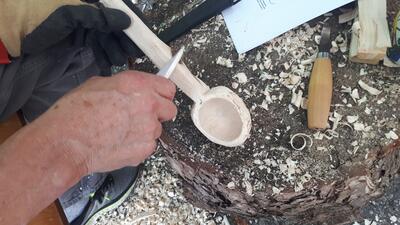
Learn to work with wood and create a beautiful and useful tool- the spoon (you will never look at a spoon the same way again). Your instructor will be Jim Jones, a spoon carver and teacher and coordinator of LSWS and Ontario Land Skills Network.

-
Tuesday 16th May 30th May 2023 5-8pm -
Wednesday 14th June 2023 5-8pm -
Tuesday 11th July 2023 5-8pm
Basket Weaving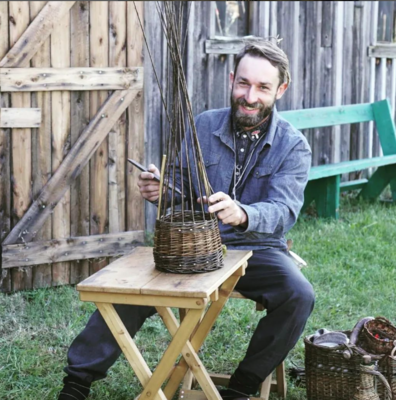
Learn to weave a willow basket on this one day workshop with Johnny Suderman
Johnny Suderman is basketmaker, willow grower and handcrafter based in Paris, Ontario. Johnny has been carrying the basket weaving tradition for a number of years now and is excited to be sharing this skill with you all.
-
Sunday July 9 10am-5pm
Nature Weaving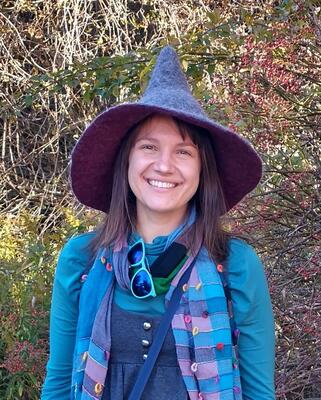
Learn to weave using willow bark, garden leaves and other natural materials. This is a beginner level workshop that will introduce you to fundamental weaving techniques and material preparation. Participants will get hands-on experience in peeling fresh willowbarkto be used in a range of projects.
-
Wednesday June 21 1-4pm -
Sunday July 23 1-4pm

Herbals for Managing Stress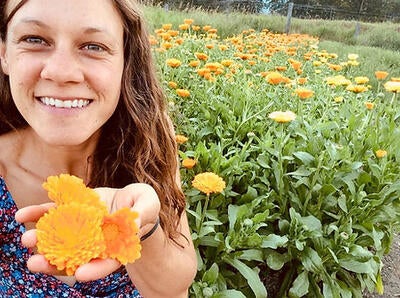
A hands-on class with the focus on plants for herbal teas.
Nikola Barsoum has been working as a small-scale organic/permaculture farmer for over ten years. She is a Certfied Community Herbalist. Nikola is passionate about growing medicinal herbs in a way that can also be medicine for the land, and continues to explore ways to do this while offering opportunities to learn and share with other growers.
-
Tuesday 6th June 2023 6-8pm -
Tuesday 8th August 6-8pm
Eastern Woodlands Spoon Carving Workshop
In association with the Waterloo Indigenous Students Centre, in this workshop John Wager, an Anishinaabe craftsman Curve Lake First Nation will focus on an Eastern Woodland style spoons, with a general presentation on Native American woodcarving/crafts. John started woodcarving in 2015 while in college for Outdoor Adventure Education by making wooden spoons, and through the years he has continued to dive deeper into my own culture with birch bark canoes, black ash baskets, as well as the tools to make them. You can find him on his website Johns Woodenware or on Instagram at @johnswoodenware.
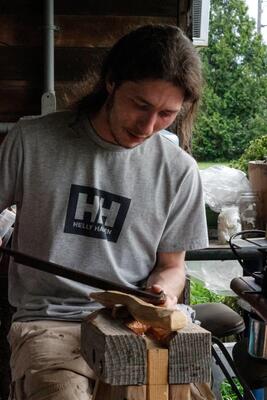

-
Saturday 15th July 2023 10am-2:30pm (Lunch provided)
Book through WISC via this link.
This workshop is only open to indigenous students, staff and faculty at the University of Waterloo.
Weaving Together With the Land Nature Walks
Want to see your campus in a whole new light? Join us for a guided walk exploring nature connection as a tool for resilience and cultural transformation. We'll share practices for connecting with the local landscape, and meet some of the flora and fauna who make their homes on the Waterloo campus. Together, we'll take up the question: what does it mean to be in an embodied, reciprocal relationship with the natural world?
Meet your guides: byron murray (@toknowtheland) is a naturalist, wildlife tracker and storyteller who shares his curiosity about the natural world through radio, writing, and educating. Danielle Gehl Hagel @eramosaherbals is an artist, herbalist and small farmer whose work explores the ways connecting with plants can help remediate our relationships with our bodies, the land and each other. Together, byron and Danielle co-facilitate Moon School, a nature connection program for adults at The Guelph Outdoor School.
-
Thursday 27th July 2023 5-7pm -
Saturday 19th August 2023 10am-12pm
Introduction to Scything
Ever wondered how we cut grass and made hay before mechanisation? Ever struggled with starting your whipper-snipper or lawn mower and wondered if there was anything less annoying, noisy, polluting and just something to make the chore more enjoyable?
Step forward the scythe...the traditional pre-industrial grass cutting tool which with the right blade can cut through small sapplings and woody burdock stems too.
In these introductory sessions you will learn the basics of scythe use to cut grass and herbacious wood.
Your instructor will be Jim Jones from the Ontario Land Skills Network and co-ordinator of the Land Skills for Wellness and Sustainability intiative. Here a short video of Jim scything rye at Mount Wolfe Farm
The following sessions in September are available:
- Thursday 22, 28 12-2, 4-6pm
- Friday 23,29 12-4-6pm
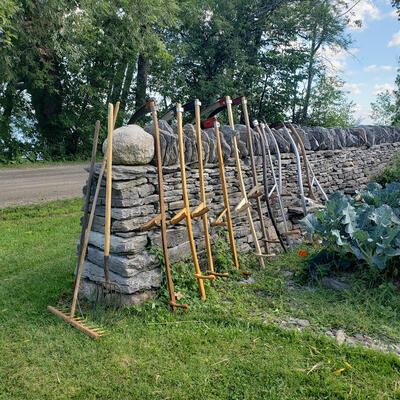
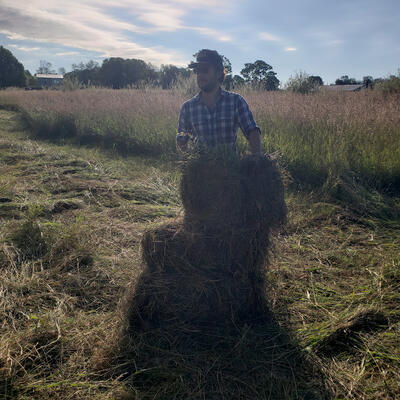
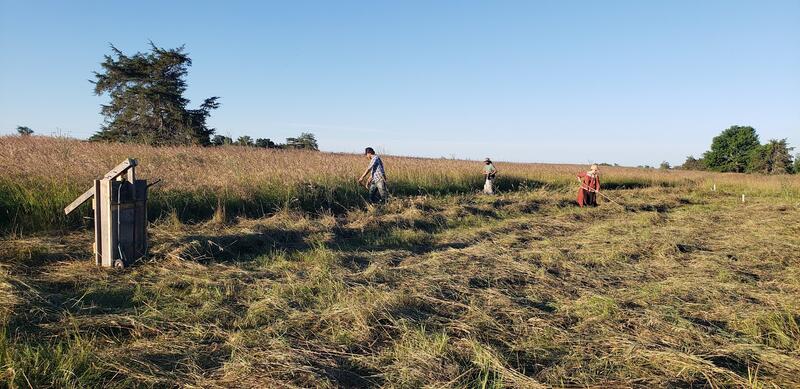
Funding
- We are grateful that this project is supported by the Waterloo Sustainability Action Fund
Publications
Inquiries
- For inquiries please contact Jim Jones
